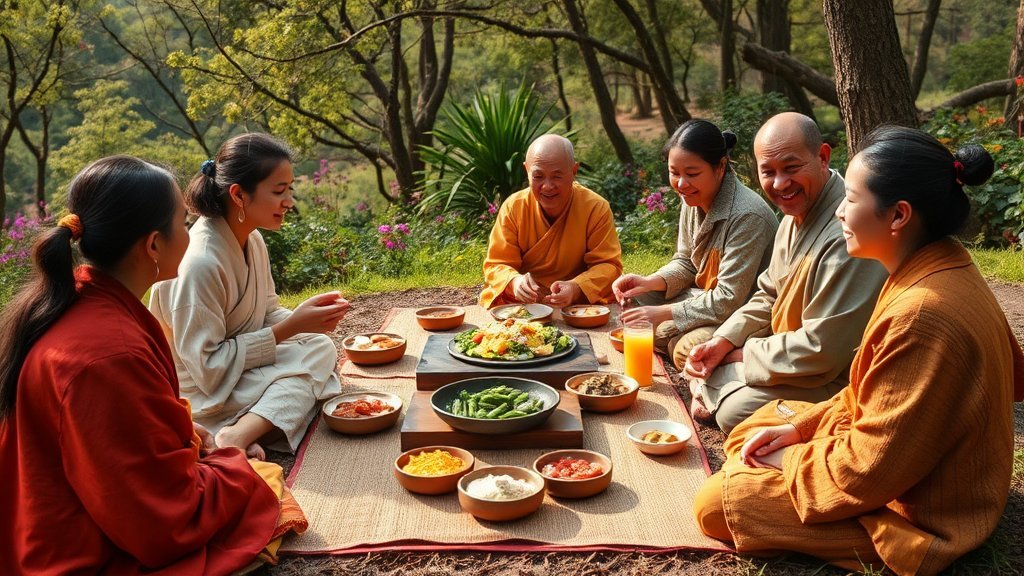Mindful Eating: A Comprehensive Guide to Buddhist Meal Planning
In today’s fast-paced world, it’s easy to overlook the significance of mindful eating. Buddhist meal planning, rooted in the concept of mindfulness, encourages individuals to cultivate a deeper appreciation for the food they consume, the company they share it with, and the environment in which they eat. This comprehensive guide will delve into the principles, benefits, and practical applications of Buddhist meal planning, exploring its potential to nourish the body, mind, and spirit.
What is Buddhist Meal Planning?
Buddhist meal planning is a holistic approach to eating that combines physical nourishment with mental and spiritual well-being. This mindful approach to meal planning encourages individuals to slow down, savor their food, and appreciate the interconnectedness of all beings involved in the food chain. By adopting a mindful approach to eating, individuals can develop a healthier relationship with food, reduce stress, and increase overall well-being.
Key Principles of Buddhist Meal Planning
- Gratitude: Expressing gratitude for the food, the people who prepared it, and the energy it provides is an essential aspect of Buddhist meal planning. This mindset helps individuals appreciate the value of their meals and the effort that goes into preparing them.
- Present-Moment Awareness: Eating in the present moment, without distractions, allows individuals to fully appreciate the sensory experiences of taste, texture, and smell. This mindful approach to eating encourages individuals to slow down and savor their food.
- Moderation: Buddhist meal planning encourages moderation in all aspects of eating, from portion sizes to food choices. This balanced approach to eating promotes overall well-being and helps individuals develop a healthier relationship with food.
- Compassion: Practicing compassion towards oneself and others is essential in Buddhist meal planning. This mindset acknowledges the interconnectedness of all beings in the food chain and encourages individuals to make food choices that promote the well-being of all.
Buddhist Meal Planning Template
Creating a Buddhist meal planning template involves considering the following components:
- Meal timing: Eating in harmony with the body’s natural rhythms, typically three meals per day.
- Food choices: Selecting foods that promote well-being, such as whole grains, fruits, and vegetables. These nutrient-dense foods provide the body with the necessary energy and nutrients to function optimally.
- Portion control: Practicing moderation in portion sizes to avoid overeating or undereating. This balanced approach to eating promotes overall well-being and helps individuals develop a healthier relationship with food.
- Mindful eating: Savoring each bite, paying attention to taste, texture, and smell. This mindful approach to eating encourages individuals to slow down and appreciate their food.
Buddhist Meal Planning Ideas
Buddhist-inspired meals are not only delicious but also nutritious and sustainable. Some creative and delicious ideas for Buddhist-inspired meals include:
- Vegetable stir-fry with whole grain rice and a side of steamed vegetables. This meal is rich in nutrients and fiber, making it an excellent choice for promoting overall well-being.
- Lentil soup with a side of whole grain bread and a fresh salad. This meal is high in protein and fiber, making it an excellent choice for vegetarians and vegans.
- Grilled fish with roasted vegetables and quinoa. This meal is rich in omega-3 fatty acids and nutrients, making it an excellent choice for promoting heart health.
- Vegan curry with brown rice and a side of steamed vegetables. This meal is high in fiber and nutrients, making it an excellent choice for vegetarians and vegans.
Buddhist Monk Eating Schedule
Buddhist monks typically follow a simple and frugal eating schedule, which includes:
- Two meals per day: One light meal in the morning and one more substantial meal in the early afternoon. This eating schedule allows monks to focus on their spiritual practice and cultivate a sense of mindfulness and gratitude.
- Fasting: Practicing fasting or reduced eating on certain days of the week or during specific periods of the year. This practice encourages monks to cultivate self-discipline and develop a greater sense of awareness.
- Mindful eating: Eating in silence, focusing on the taste, texture, and smell of each bite. This mindful approach to eating encourages monks to slow down and appreciate their food.
Buddhist Meal Planning for Weight Loss
Buddhist meal planning can be an effective approach to weight loss, as it encourages:
- Moderate eating: Practicing portion control and avoiding overeating. This balanced approach to eating promotes overall well-being and helps individuals develop a healthier relationship with food.
- Healthy food choices: Selecting whole, nutrient-dense foods that promote satiety and energy. These foods include fruits, vegetables, whole grains, and lean proteins.
- Mindful eating: Savoring each bite, reducing stress and emotional eating. This mindful approach to eating encourages individuals to slow down and appreciate their food, reducing the likelihood of overeating.
Buddhist Foods for Special Occasions
Buddhist cuisine offers a variety of delicious and festive dishes for special occasions, such as:
- Vegan sushi: A plant-based twist on traditional sushi, perfect for celebrations and gatherings. This dish is rich in nutrients and fiber, making it an excellent choice for promoting overall well-being.
- Vegetable skewers: Colorful and flavorful skewers of marinated vegetables, ideal for outdoor events. This dish is high in nutrients and fiber, making it an excellent choice for vegetarians and vegans.
- Fruit salad: A refreshing and nutritious fruit salad, perfect for hot summer days. This dish is rich in vitamins and minerals, making it an excellent choice for promoting overall well-being.
Frequently Asked Questions
Q: Is Buddhist meal planning suitable for vegetarians and vegans?
A: Yes, Buddhist meal planning emphasizes plant-based eating and encourages individuals to adopt a vegetarian or vegan diet.
Q: Can I still enjoy my favorite foods while following a Buddhist meal plan?
A: Yes, Buddhist meal planning encourages moderation and balance. You can still enjoy your favorite foods in moderation, as long as they align with your values and promote overall well-being.
Q: How can I incorporate mindfulness into my daily meals?
A: Start by eating in silence, focusing on the taste, texture, and smell of each bite. You can also practice deep breathing exercises or meditation before meals to cultivate a sense of calm and awareness.
Conclusion
Buddhist meal planning offers a unique and holistic approach to nourishing the body, mind, and spirit. By incorporating mindfulness, gratitude, and compassion into your daily meals, you can develop a deeper appreciation for the food you eat and the world around you. Whether you’re looking to improve your physical health, reduce stress, or cultivate a greater sense of well-being, Buddhist meal planning can be a powerful tool on your journey towards a more balanced and fulfilling life.
Actionable Takeaways
- Start by eating in silence, focusing on the taste, texture, and smell of each bite.
- Practice deep breathing exercises or meditation before meals to cultivate a sense of calm and awareness.
- Incorporate mindfulness into your daily meals by savoring each bite and paying attention to your body’s hunger and fullness cues.
- Experiment with new recipes and flavors to find healthy and delicious meals that nourish your body and soul.
- Cultivate gratitude for the food you eat and the people who prepared it by expressing thanks before each meal.
By incorporating these principles and ideas into your daily meals, you can cultivate a greater sense of mindfulness, gratitude, and compassion, leading to a more balanced and fulfilling life.
Take Action
Ready to elevate your general experience? Apply the insights from this guide and see the difference for yourself. Remember, consistency is key to achieving your goals. Start implementing these strategies today and watch your progress soar!



